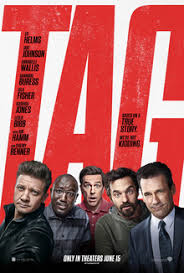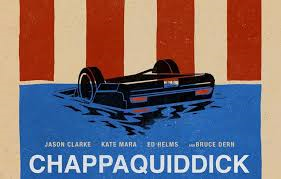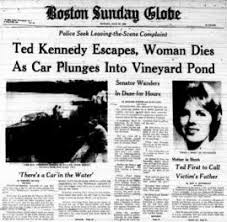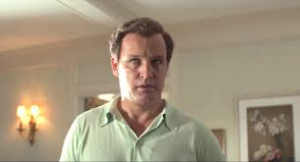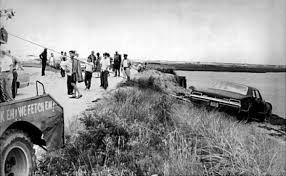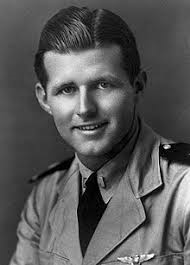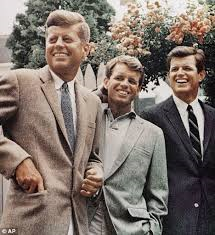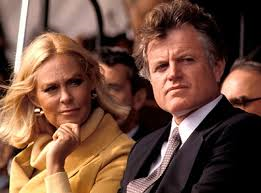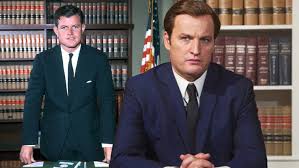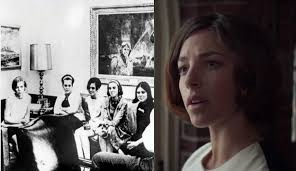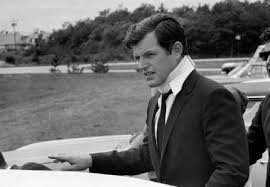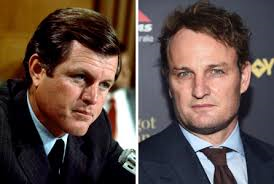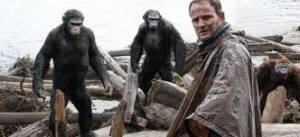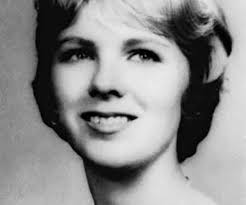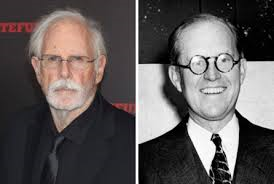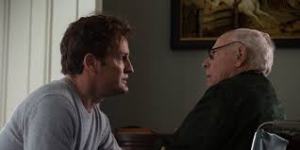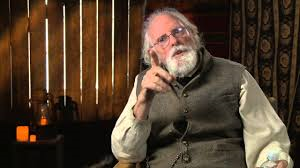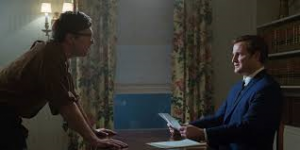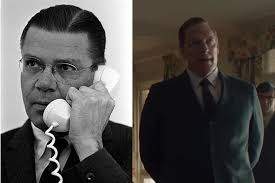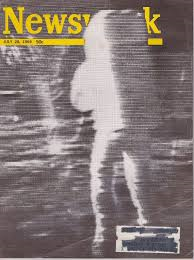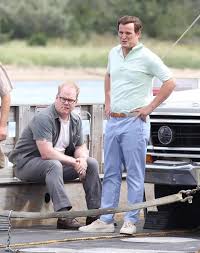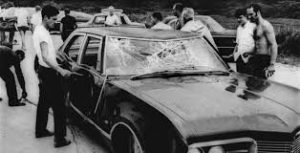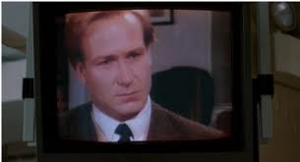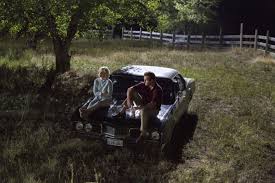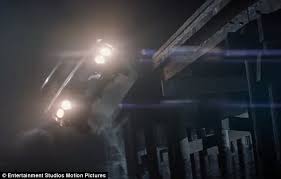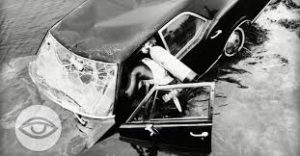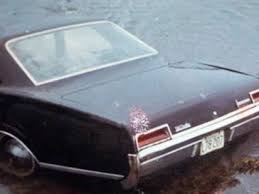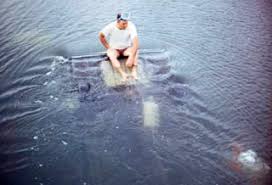SHORT TAKE:
Based loosely on the real life camaraderie amongst 10 friends who have been playing the same game of Tag one month a year for 30 years, the movie Tag focuses on a representative five, plus one wife, a fiancee, and a reporter from the Wall Street Journal who breaks the story to the world.
WHO SHOULD GO:
Not for kids. Young adults and up only. The language and topics discussed are often raw and juvenilely crude and graphic. And the stunts these men are shown to pull are dangerous even under the supervision of stunt men,  as Jeremy Renner found out. You would not want young impressionable kids trying to imitate them. UNLESS you want to show them clips and this photo to make the point – DON’T TRY THIS AT HOME!!!
as Jeremy Renner found out. You would not want young impressionable kids trying to imitate them. UNLESS you want to show them clips and this photo to make the point – DON’T TRY THIS AT HOME!!!
LONG TAKE:
“You do not stop playing games because you grow old, you grow old because you stop playing games.” This rather wise saying by George Bernard Shaw is the avowed, often repeated, theme of the movie Tag.
I have often advised my girls and teased my husband and sons that I do not believe men ever really get beyond the age of 13. Be they the Pope, your husband, your 80 year old grandfather, your investment broker, or your doctor, they hit puberty and that’s — that. The only difference amongst them is their ability to hide it. It’s one of the things that is most charming about them and used properly is a superpower.
And for anyone who does not believe me, you should see Tag, the movie, 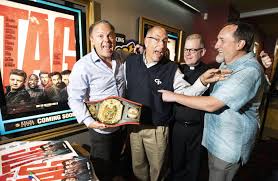 based on a real group of ten men, written up in a 2013 Wall Street Journal article by Russell Adams..
based on a real group of ten men, written up in a 2013 Wall Street Journal article by Russell Adams.. Back row, from left to right: Mike Konesky, Bill Akers, Patrick Shultheis, Mark Mengert, Chris Ammann and Brian Dennehy. Front row, from left to right: Father Sean Raftis, Joey Tambari, Joe Caferro and Rick Bruya. (Courtesy of Father Sean Raftis )
Back row, from left to right: Mike Konesky, Bill Akers, Patrick Shultheis, Mark Mengert, Chris Ammann and Brian Dennehy. Front row, from left to right: Father Sean Raftis, Joey Tambari, Joe Caferro and Rick Bruya. (Courtesy of Father Sean Raftis ) 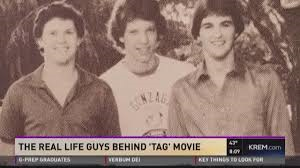 These men, from all walks of life, one a priest, met at a Catholic school and have been playing the same game of Tag, on and off, for THIRTY years. The Tag Brothers as they call themselves, particpate in this childlike joyous event for one month every year as a way to keep in touch —- literally — with each other. They have played despite and sometimes because of: births, deaths, weddings, illness and distances. They have tagged each other, in real life, by their own admission: in disguise, after flying hundreds of miles, appearing at family events, and even breaking into each others’ HOMES! It’s a wonder none of them have shot the other yet.
These men, from all walks of life, one a priest, met at a Catholic school and have been playing the same game of Tag, on and off, for THIRTY years. The Tag Brothers as they call themselves, particpate in this childlike joyous event for one month every year as a way to keep in touch —- literally — with each other. They have played despite and sometimes because of: births, deaths, weddings, illness and distances. They have tagged each other, in real life, by their own admission: in disguise, after flying hundreds of miles, appearing at family events, and even breaking into each others’ HOMES! It’s a wonder none of them have shot the other yet. 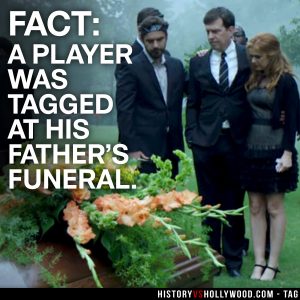 One got tagged during his father’s funeral – the taggee acknowledging it was a form of comfort and condolence and that his father, a big supporter of their game, would have thought funny. The group collected to support one of them when his wife was undergoing chemo and tagged him there. They have tagged each other when wives were in labor, and even when those children were being conceived!! (I do NOT even want to IMAGINE that one!) It is the way these men have chosen to stay friends.
One got tagged during his father’s funeral – the taggee acknowledging it was a form of comfort and condolence and that his father, a big supporter of their game, would have thought funny. The group collected to support one of them when his wife was undergoing chemo and tagged him there. They have tagged each other when wives were in labor, and even when those children were being conceived!! (I do NOT even want to IMAGINE that one!) It is the way these men have chosen to stay friends.
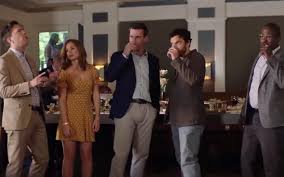 As funny as this premise is you’d think it would be a one trick pony, perhaps documentary worthy but not enough to carry a movie. But you’d be wrong.
As funny as this premise is you’d think it would be a one trick pony, perhaps documentary worthy but not enough to carry a movie. But you’d be wrong. 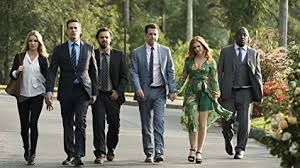 The screenwriters, Rob McKittrich and Mark Steilen, have rather cleverly condensed the reality and formed it into an analogy for what keeps people together.
The screenwriters, Rob McKittrich and Mark Steilen, have rather cleverly condensed the reality and formed it into an analogy for what keeps people together.
SPOILERS
Obviously an ensemble cast, to introduce them in rough order of appearance:  Ed Helms as Hoagie, a successful veterinarian married to Isla Fisher’s extremely competitive Anna.
Ed Helms as Hoagie, a successful veterinarian married to Isla Fisher’s extremely competitive Anna. 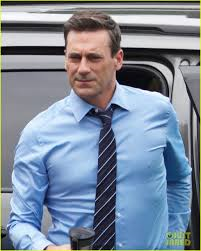 Jon Hamm plays Bob, a wealthy CEO of a drug manufacturing company.
Jon Hamm plays Bob, a wealthy CEO of a drug manufacturing company.  Annabelle Willis is Rebecca, the reporter who embeds herself into the group.
Annabelle Willis is Rebecca, the reporter who embeds herself into the group. 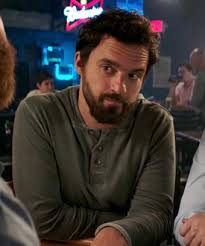 Jake Johnson is “Chili,” the loser friend, stuck in his hippie, weed smoking, teenaged days.
Jake Johnson is “Chili,” the loser friend, stuck in his hippie, weed smoking, teenaged days. 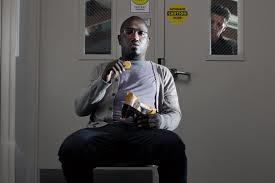 Hannibal Buress is Sable, an air-heady sweet guy who sees life existentially.
Hannibal Buress is Sable, an air-heady sweet guy who sees life existentially. 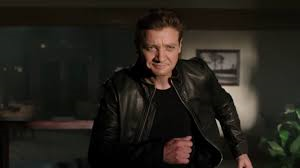 And then there is Jerry – Jeremy “Hawkeye” and “Bourne” Renner – waxing and waning with the group as they pursue him during his wedding preparations. He is the main target this year because, in thirty years of playing tag with these same four friends, he has NEVER —- BEEN —– TAGGED, and rumor has it he will retire at the end of the month.
And then there is Jerry – Jeremy “Hawkeye” and “Bourne” Renner – waxing and waning with the group as they pursue him during his wedding preparations. He is the main target this year because, in thirty years of playing tag with these same four friends, he has NEVER —- BEEN —– TAGGED, and rumor has it he will retire at the end of the month. 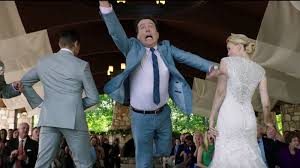 And there is almost no lengths to which these men will not go – physically, legally or in mental gamesmanship – in order to avoid being the last “it” – or to end the game without Jerry being tagged at least once.
And there is almost no lengths to which these men will not go – physically, legally or in mental gamesmanship – in order to avoid being the last “it” – or to end the game without Jerry being tagged at least once.
 The personalities in the story are composites. There are no comparable individuals who are directly represented in the movie, but the premise and inspiration which ignited this crazy story did and does continue. The game, as it were, is STILL a foot!
The personalities in the story are composites. There are no comparable individuals who are directly represented in the movie, but the premise and inspiration which ignited this crazy story did and does continue. The game, as it were, is STILL a foot!
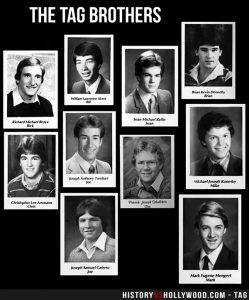 WSJ also published the Tag Agreement drafted and signed as young adults by the Tag Brothers, based upon the rules they followed as children.
WSJ also published the Tag Agreement drafted and signed as young adults by the Tag Brothers, based upon the rules they followed as children.
I normally consider profanity in movies largely a lack of creativity. But I have to admit on some level it is appropriate in Tag. 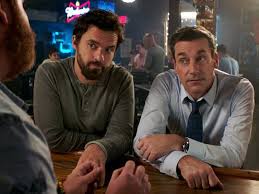 Once the game is on, the men revert to the crude one-upsman language of adolescent teenagers – comparing and hitting genitalia, awkwardly throwing out “cuss” words, and using profanity as though they are trying to win a secondary competition for the most vulgarity. But this is what little boys do.
Once the game is on, the men revert to the crude one-upsman language of adolescent teenagers – comparing and hitting genitalia, awkwardly throwing out “cuss” words, and using profanity as though they are trying to win a secondary competition for the most vulgarity. But this is what little boys do.  They play rough and crash headlong in and through windows, businesses, private homes, yards and garbage cans during the chases.
They play rough and crash headlong in and through windows, businesses, private homes, yards and garbage cans during the chases. 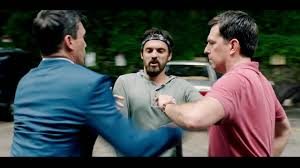 So energetic were the scenes, that, during one failed stunt involving a stack of chairs, Jeremy Renner broke bones in both arms. The rest of the movie was filmed having to CGI around the “green screen” casts he had to wear.
So energetic were the scenes, that, during one failed stunt involving a stack of chairs, Jeremy Renner broke bones in both arms. The rest of the movie was filmed having to CGI around the “green screen” casts he had to wear.
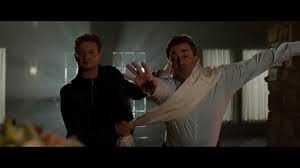 But what was most charming about Tag was the moral to the story. Jerry, the all time champion who had never been tagged, knew everything about his friends. He knew how they thought, acted, what they did for a living, the strengthes and weaknesses of their personalities and could thereby anticipate any schemes to trap him. This, and his almost superhuman running speed, has kept him the reigning champion for 30 years.
But what was most charming about Tag was the moral to the story. Jerry, the all time champion who had never been tagged, knew everything about his friends. He knew how they thought, acted, what they did for a living, the strengthes and weaknesses of their personalities and could thereby anticipate any schemes to trap him. This, and his almost superhuman running speed, has kept him the reigning champion for 30 years. 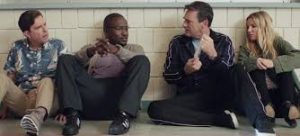 Ironically, but in hindsight predictably, his friends knew very little about him.
Ironically, but in hindsight predictably, his friends knew very little about him. 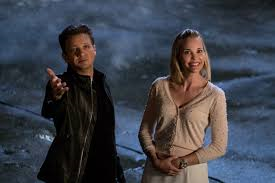 They didn’t know he was getting married or to whom.
They didn’t know he was getting married or to whom. 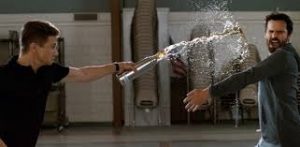 They didn’t know he had a drinking problem or that he was in AA – until they bribed one of Jerry’s own employees to rat out Jerry’s location. Jerry may have been the Olympic Tag gold medalist, but the cost was not spending any time with his friends during the one month the rest were together scheming to get him. Tag deals with the 30 years’ resolution to this conundrum.
They didn’t know he had a drinking problem or that he was in AA – until they bribed one of Jerry’s own employees to rat out Jerry’s location. Jerry may have been the Olympic Tag gold medalist, but the cost was not spending any time with his friends during the one month the rest were together scheming to get him. Tag deals with the 30 years’ resolution to this conundrum.
It is the heart to this goofy movie which helps ratchet Tag above its threadbare premise.
Another clever and memorable aspect to Tag are the homages to other movie genres. A number of schemes are attempted to tag Jerry. One plays out like a classic monster movie as the group moves through a foggy forest. Another scenario includes Jerry’s internal POV voice-over describing his analysis of their attacks and how he plans to countermand them – much like Downey, Jr.’s Sherlock Holmes. 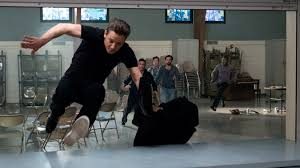 Other scenes give nods to Renner’s stint as the Bourne Legacy character Aaron Cross as he uses everything from tablecloths to donuts and a walker to thwart his friends and leap chairs, through windows and around staircases with an agility that his own Avenger‘s Hawkeye would have admired.
Other scenes give nods to Renner’s stint as the Bourne Legacy character Aaron Cross as he uses everything from tablecloths to donuts and a walker to thwart his friends and leap chairs, through windows and around staircases with an agility that his own Avenger‘s Hawkeye would have admired.
As ridiculous as this movie is, I could not help but smile at the irresistable charm of grown men letting loose in a spirit of genuine fun with their friends. If the quote by Shaw is right, the Tag Brothers will remain eternally young as they keep their bonds of friendship alive. And that is a game worth playing.
